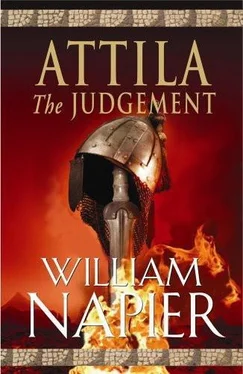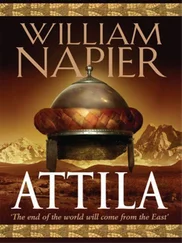William Napier - The Judgement
Здесь есть возможность читать онлайн «William Napier - The Judgement» весь текст электронной книги совершенно бесплатно (целиком полную версию без сокращений). В некоторых случаях можно слушать аудио, скачать через торрент в формате fb2 и присутствует краткое содержание. Жанр: Исторические приключения, на английском языке. Описание произведения, (предисловие) а так же отзывы посетителей доступны на портале библиотеки ЛибКат.
- Название:The Judgement
- Автор:
- Жанр:
- Год:неизвестен
- ISBN:нет данных
- Рейтинг книги:5 / 5. Голосов: 1
-
Избранное:Добавить в избранное
- Отзывы:
-
Ваша оценка:
- 100
- 1
- 2
- 3
- 4
- 5
The Judgement: краткое содержание, описание и аннотация
Предлагаем к чтению аннотацию, описание, краткое содержание или предисловие (зависит от того, что написал сам автор книги «The Judgement»). Если вы не нашли необходимую информацию о книге — напишите в комментариях, мы постараемся отыскать её.
The Judgement — читать онлайн бесплатно полную книгу (весь текст) целиком
Ниже представлен текст книги, разбитый по страницам. Система сохранения места последней прочитанной страницы, позволяет с удобством читать онлайн бесплатно книгу «The Judgement», без необходимости каждый раз заново искать на чём Вы остановились. Поставьте закладку, и сможете в любой момент перейти на страницу, на которой закончили чтение.
Интервал:
Закладка:
Aetius said nothing.
Valentinian’s mouth began to work. ‘Your boyhood friend, the Scourge of God, is no more. You must feel that a light has gone out of your life, that your sense of purpose, of mission, is over. That your whole career is over, in fact.’
Still Aetius said nothing.
Valentinian leaped to his feet and stood shaking. ‘Answer me, damn you! Standing there in dumb insolence like Christ before Pilate! Who do you think you are?’
‘My apologies, Majesty. I was not aware that you had asked a question.’
The emperor gave a strangulated cry and rushed down the steps towards him. He fought for self-control, grew quieter again, and began to pace around Aetius, examining him as he might a strange animal in his menagerie. Aetius remained quite still.
‘You make me anxious, Master-General. You are not like other men.’
Aetius could almost have smiled at this. Coming from you, Your Majesty…
‘And, you see, this leaves us with a problem. Indeed, my dreams point to many problems, and the word of God which comes to me in the night tells me of only one solution.’
‘Majesty, my most ardent wish is to be quit of the court, to relinquish my command, and to go on a pilgrimage. To Jerusalem.’
‘To Jerusalem, you say!’ His mouth began to work again, and his words became garbled. ‘And what will you do and say and plot out there in the mysterious shining east, I wonder? Is not the old empress, there too? Old Eudoxia, a great and cunning enemy of the Empress Pulcheria, eh?’
‘Majesty, I do not believe-’
‘And I do not believe, either!’ cried Valentinian furiously. ‘I do not believe that it is your “most ardent wish” at all to go to Jerusalem, to dirty your knees in prayer all the way up the Via Dolorosa to the Holy Sepulchre, along with all the other low-born pilgrims! You would not so humble yourself, Master-General, great victor of the Catalaunian Fields! No, we must not let you get away, we must monitor you. There is no need for you to visit Jerusalem, to see Calvary with your own eyes. I will show you Calvary right here!’
The emperor began fumbling beneath his robes. Aetius’ grey eyes were very still, looking straight ahead. He did not stir to protect himself.
‘I will show you Calvary, you, you…’ Imperial spittle flew in Aetius’ face. ‘You brazen traitor! Hold his arms out!’
Four guards seized him, two on each arm. He could not resist, and he did not try. He only glanced left and right to see their faces. Lads of eighteen or nineteen, new appointments, obedient slaves. Even though they hardly knew him, they lowered their faces before his searching gaze. He wanted to say something to them at this last moment, knowing that they were not to blame, but suddenly his body was ablaze with agony and his throat was taut and wordless. For Valentinian had produced a long blade and thrust it up beneath his ribs. Aetius gasped and his eyelids fluttered and lowered. Through the haze he saw the emperor’s grinning face, his spittle-flecked chin almost touching his own as he twisted the knife.
The four guards let go of his arms and stepped back, and he staggered. Only then did the other courtiers and counsellors crowd around with their own daggers in hand, and join in killing the man who had saved them from ruin a dozen times. Old Quintilianus alone stood back.
His eyes filmy with death, glazed and misted, his body twisting and falling, his last breath exhaling, what did he see as he fell? Did he see the Triumphal Way, the City on the Seven Hills, the great Basilica of St Peter, the Capitoline? Did he see his beloved legions, scarlet plumes and pennants fluttering in the breeze? Did he see the grim face of his enemy, the Scourge of God? Or did he see a vision of Jerusalem?
As they stood staring down at the savaged body, Quintilianus spoke from behind them.
‘Your Majesty,’ he said quietly. ‘You have cut off your right hand with your left.’
For Aetius there were no songs of praise or lamentation. Reader, it is not I who concoct the ironies of history. I can but tell the truth. Only a handful mourned Aetius’ passing, a handful in all of Italy. Most of his friends had died on the Catalaunian Plains. If the news ever reached the island of Britain, there would have been mourning. In the Court of the Visigoths at Tolosa, there was deep, deep mourning. But in his homeland…
Attila the Destroyer went to his death praised and beloved and glorified by lavish funeral rites, much loved among his fierce people.
Aetius the Saviour, the last and noblest Roman of them all, to whom all of Christendom and the West owes an incalculable debt – his savaged body was wrapped in sacking and quietly dropped in a marsh. This much he has in common with his great enemy: none knows where he is buried.
But surely the believers must be right, and the history of this world is not everything; but there is another story, in which justice will be done. Oh, let it be so. Or else this world is not worth a handful of dung.
The widow of Emperor Theodosius, Eudoxia, was still in Jerusalem when she heard news of the death of Aetius. She immediately went to the Church of the Holy Sepulchre to pray. She prayed for a long time. And for many evenings after, she loved to sit on a moonlit balcony and look out over the Golden City of Zion.
She never returned to Constantinople.
Only a few weeks later, the Emperor Valentinian was watching soldiers drilling on the Campus Martius when he was set upon by two of them and slain. The soldiers observed, ‘He dies easily for a God!’ None of the other soldiers fought in his defence. Some say that the emperor’s killers had served with Aetius himself, and had even fought at the battle of the Catalaunian Fields. Some say that one of them was a centurion with an iron countenance and hard, unblinking eyes.
Two years later, the Vandals sailed up the Tiber and sacked Rome. They had sailed from Carthage. The sack was savage and merciless, for there was barely a defence force to speak of, and King Genseric had grown no less cruel since his three sons were slain in Gaul. Bishop Leo pleaded with him to spare lives. When the Vandals withdrew, they left behind them crumbling theatres and circuses, dazed and wandering remnants of the populace lost in the immense space and emptiness of their ruined public baths, once-stately libraries and halls of justice. All were ransacked and stripped bare. Yet from the Church of St Peter, hymns of praise still sounded. What were treasures and statuary compared with human lives? The Lord giveth and the Lord taketh away, preached Bishop Leo. Blessed be the name of the Lord.
The Vandals did not grow rich from their raid. A huge summer storm blew up, and much of Genseric’s fleet was wrecked and sunk. All the treasures of Rome lie on the Mediterranean seabed somewhere between Rome and Carthage. They lie for ever in those silent depths among the weeds, half the treasures of the Ancient World: diadems of Indian pearls, Egyptian emeralds, silver chalices, that priceless chandelier of solid gold, hung with fifty dolphins, that once hung in the Lateran Palace. Perhaps even the Ark of the Covenant, which Titus had looted from Jerusalem four long centuries before…
After Valentinian there was a succession of emperors enthroned and then soon murdered, each one feeble and less memorable than the last. In the year 476 the last enervated act was played out.
The penultimate Emperor of Rome, Julius Nepos, was deposed by an old and treacherous soldier, and the soldier’s son, Romulus Augustulus, installed in his stead. Many said that the boy was in truth the old soldier’s grandson, but he lied to prove his potency. The old soldier must have been in his seventies. He was a Greek by birth, and his name was Orestes, and his son inherited his fair hair. In his younger years he had been Attila’s right-hand man. It was incredible, but it was so. The last emperor was Orestes’ son.
Читать дальшеИнтервал:
Закладка:
Похожие книги на «The Judgement»
Представляем Вашему вниманию похожие книги на «The Judgement» списком для выбора. Мы отобрали схожую по названию и смыслу литературу в надежде предоставить читателям больше вариантов отыскать новые, интересные, ещё непрочитанные произведения.
Обсуждение, отзывы о книге «The Judgement» и просто собственные мнения читателей. Оставьте ваши комментарии, напишите, что Вы думаете о произведении, его смысле или главных героях. Укажите что конкретно понравилось, а что нет, и почему Вы так считаете.












